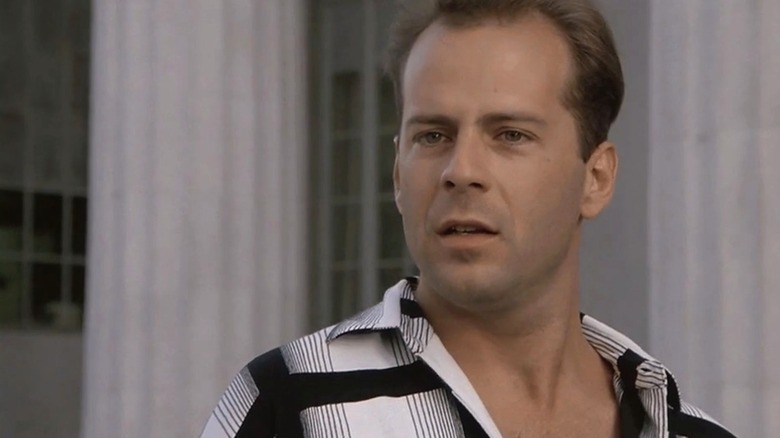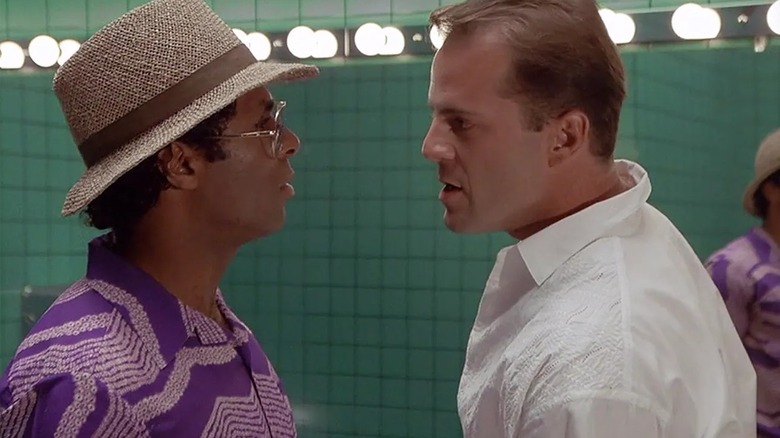Bruce Willis requires no introduction. Aside from the (epic) “Die Exhausting” franchise, the actor has appeared in a variety of mega-popular movies — from “Sin Metropolis” to “The Expendables” — and established himself as a bonafide motion hero. Whereas Willis’ profession is peppered with more than one hundred performances, it is time to return in time and take a look at considered one of his first performing roles earlier than he acquired launched into stardom. Before his breakout role in “Moonlighting,” Willis had a visitor put up in an episode of “Miami Vice,” titled “No Exit.” This season one episode would find yourself turning into distinguished for multiple purpose, because it proved to be a turning level in cementing the present’s recurring themes and narrative archetypes.
This formulaic high quality distinctive to “Miami Vice” is likely to be perceived as stale by modern requirements, however even when the sequence stumbled to seek out its footing, it was always pushing boundaries. Because of this, Willis’ flip as an antagonist in “No Exit,” which is taken into account one of many extra entertaining entries within the first season, feels undoubtedly vital. This episode, as typical, follows undercover Metro-Dade cops Sonny (Don Johnson) and Ricardo (Philip Michael Thomas), who at the moment are investigating a deal involving army {hardware}. After the sellers are arrested, all fingers are pointed at Tony Amato (Willis), an elusive provider planning to promote stolen missiles. Issues get uglier as soon as Amato’s spouse Rita (Katherine Borowitz) will get concerned and divulges Amato’s obsessive, abusive nature when coping with the whole lot he feels he is owed.
Let’s take a more in-depth take a look at Willis’ Amato in “No Exit,” and the way the episode affords rather more than your customary police procedural by diving into deeply existential waters.
Bruce Willis makes a robust impression as a one-off Miami Vice villain
The episode’s title references thinker Jean-Paul Sartre’s ebook of the identical identify, and that is past such a cursory nod. “No Exit” explores the Satrean outlook of all relationships being primarily based on a battle for dominance, the place the inevitable presence of battle drives our defining worldviews. The favored, and oft misinterpreted quote “Hell is different folks” stems from this ebook, basically underlining how the gaze and actions of the “different” (versus the self) can affect our selections and rob us of freedom. Sartre argues that after this intuition to make selections prompted by self-volition is taken away, it’s akin to denying our humanity.
Willis’ Amato embodies the intense manifestation of the “different,” as he’s the one pulling the strings and influencing these round him to their detriment. He’s the sort of villain with no (self-justifiable) rules and views folks as objects which can be both worthy of being coveted or doomed to be discarded. Due to these skewed energy dynamics, Amato robs folks of their selections, and by extension, their freedom to be rid of his noxious affect. Willis performs this unsavory character by juxtaposing a swagger-heavy perspective with really heinous acts, with an obnoxious wardrobe to drive the efficiency residence. You possibly can’t assist however detest Amato for being such a prick, which makes the second of his inevitable downfall deliciously cathartic.
There’s a lot to love about “No Exit” even past a pre-“Moonlighting” Willis, so I’ll go away it as much as you of us to test it out, in case you have not already. Additionally, it’s no marvel that the actor turned an absolute sensation as Detective David Addison as soon as “Moonlighting” began airing on ABC a 12 months later, though a large chunk of the present’s enchantment may be attributed to the character’s electrifying chemistry with Cybill Shepherd’s Maddie Hayes. For sure, “Moonlighting” makes for great television, and you’ll catch it on Hulu in case you wish to cleanse the existential vibes of “No Exit” with one thing extra comforting.
Bruce Willis requires no introduction. Aside from the (epic) “Die Exhausting” franchise, the actor has appeared in a variety of mega-popular movies — from “Sin Metropolis” to “The Expendables” — and established himself as a bonafide motion hero. Whereas Willis’ profession is peppered with more than one hundred performances, it is time to return in time and take a look at considered one of his first performing roles earlier than he acquired launched into stardom. Before his breakout role in “Moonlighting,” Willis had a visitor put up in an episode of “Miami Vice,” titled “No Exit.” This season one episode would find yourself turning into distinguished for multiple purpose, because it proved to be a turning level in cementing the present’s recurring themes and narrative archetypes.
This formulaic high quality distinctive to “Miami Vice” is likely to be perceived as stale by modern requirements, however even when the sequence stumbled to seek out its footing, it was always pushing boundaries. Because of this, Willis’ flip as an antagonist in “No Exit,” which is taken into account one of many extra entertaining entries within the first season, feels undoubtedly vital. This episode, as typical, follows undercover Metro-Dade cops Sonny (Don Johnson) and Ricardo (Philip Michael Thomas), who at the moment are investigating a deal involving army {hardware}. After the sellers are arrested, all fingers are pointed at Tony Amato (Willis), an elusive provider planning to promote stolen missiles. Issues get uglier as soon as Amato’s spouse Rita (Katherine Borowitz) will get concerned and divulges Amato’s obsessive, abusive nature when coping with the whole lot he feels he is owed.
Let’s take a more in-depth take a look at Willis’ Amato in “No Exit,” and the way the episode affords rather more than your customary police procedural by diving into deeply existential waters.
Bruce Willis makes a robust impression as a one-off Miami Vice villain
The episode’s title references thinker Jean-Paul Sartre’s ebook of the identical identify, and that is past such a cursory nod. “No Exit” explores the Satrean outlook of all relationships being primarily based on a battle for dominance, the place the inevitable presence of battle drives our defining worldviews. The favored, and oft misinterpreted quote “Hell is different folks” stems from this ebook, basically underlining how the gaze and actions of the “different” (versus the self) can affect our selections and rob us of freedom. Sartre argues that after this intuition to make selections prompted by self-volition is taken away, it’s akin to denying our humanity.
Willis’ Amato embodies the intense manifestation of the “different,” as he’s the one pulling the strings and influencing these round him to their detriment. He’s the sort of villain with no (self-justifiable) rules and views folks as objects which can be both worthy of being coveted or doomed to be discarded. Due to these skewed energy dynamics, Amato robs folks of their selections, and by extension, their freedom to be rid of his noxious affect. Willis performs this unsavory character by juxtaposing a swagger-heavy perspective with really heinous acts, with an obnoxious wardrobe to drive the efficiency residence. You possibly can’t assist however detest Amato for being such a prick, which makes the second of his inevitable downfall deliciously cathartic.
There’s a lot to love about “No Exit” even past a pre-“Moonlighting” Willis, so I’ll go away it as much as you of us to test it out, in case you have not already. Additionally, it’s no marvel that the actor turned an absolute sensation as Detective David Addison as soon as “Moonlighting” began airing on ABC a 12 months later, though a large chunk of the present’s enchantment may be attributed to the character’s electrifying chemistry with Cybill Shepherd’s Maddie Hayes. For sure, “Moonlighting” makes for great television, and you’ll catch it on Hulu in case you wish to cleanse the existential vibes of “No Exit” with one thing extra comforting.




















